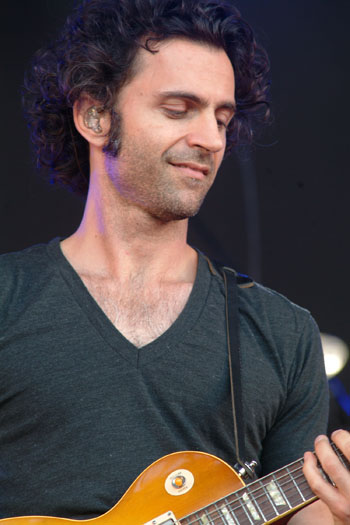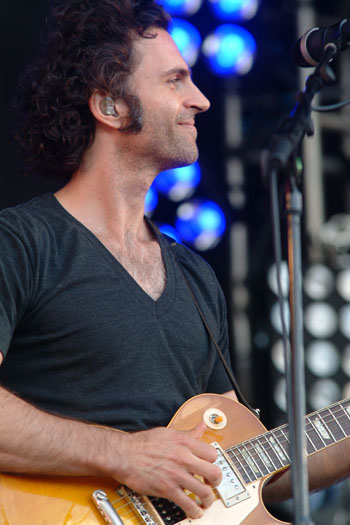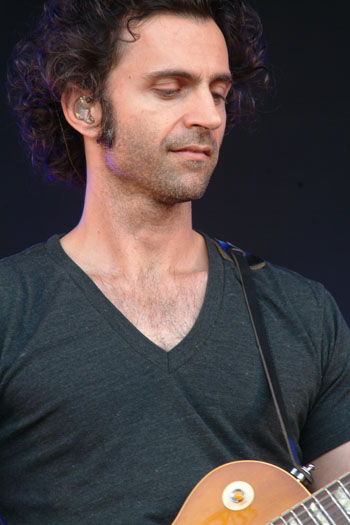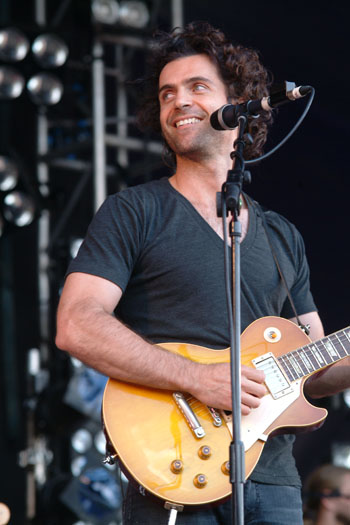Dweezil's Ripped My Flesh? Well Dweezil Zappa has certainly
scratched the surface with a deep seated commitment to bring his
dad's music to a new generation of fans.
Dweezil Zappa's double live CD 'Son of the Son of' sees the late
Frank Zappa's guitar playing/vocalising son move into his fifth
year as a band leader and curator of his dad's ground breaking
music.
But as he is quick to point out ' this project isn't a short lived
cover band but a representation of Frank Zappa's music in its
broadest perspective'.
Dweezil and his band are in the middle of a European tour (July
2010) that takes in several festivals including London's High
Voltage Festival and with a forthcoming DVD also in the pipeline
they appear to be in it for the long haul.
Pete Feenstra talks to Dweezil Zappa about his guitar playing,
his band, the new album and of course the music of Frank Zappa.
From the opening the opening angular intensity of 'The Deathless
Horse' to the fluid soloing and the climactic finish on 'Pygmy
Twylyte, 'Return of The Son Of' is topped and tailed by
Dweezil's imperious guitar playing. Clearly the boy has been
practicing.
You have said in interviews that 'I had to graduate from
being a guitar player to being a musician'. Was the reason you
didn't do that before because you sought out your own solo
career away from your dad's music?
It was more to do with the way I approached playing the guitar.
The thing is that too often guitar players just view things in
terms of what it is they play on their known instrument. They
are too guitar centric. And what they do and think about often
bears no relation to the rest of the ensemble.
Frank's music was really classical music played by a rock band.
And that being the case it is very important for everyone's role
to support each other, that's how compositions work.
Frank used to say his guitar playing was only as good as the band
members that supported him. So I was in that position of needing
to learn more. I hadn't been trained and hadn't studied this at
all. I knew a lot about guitar playing but next to nothing about
this role.
And so when I decided to approach Franks work, I realised I needed
to work on my playing as well getting to understand the language
of music and understanding my instrument in its role with the
rest of the ensemble

Photo by
Noel Buckley
Did you ever feel a weight of expectation on your shoulders
with this project or did that diminished with the passing of
time?
No nothing like that really. I think if I had felt any pressure
like that I wouldn't have undertaken a project like Zappa plays
Zappa.
The goal was to present the music in a respectful manner to a new
audience - to people who maybe didn't previously have a chance
to see it and experience it live. Of course when we started it
was playing to a core audience but the aim was always to expand
on that.
Isn't that difficult to expand an audience with limited media
coverage?
Yes it is, so we started with a kind of a grassroots approach. I
didn't want Frank's music to just be forgotten or to just stay
with an older generation and one of the ways to fight that is to
expose it a younger audience. So one of my goals was to give
more people the opportunity to see it in a live situation.
There's nothing I can do about getting it on the radio or
magazines beyond a certain point. So I thought I had to start by
studying his music, understanding it, learning it really well
and then giving people the chance to see it by trying to take it
on the road.
In the process I gained so much as a musician and learning the
music transformed my own playing abilities. I was already a
technically proficient guitar player but I graduated far beyond
anything that I ever dreamed I could do on a guitar.
Also from the word go we saw this project as something
fundamentally different from a tribute/cover band. Those bands
tend to go down the nostalgia route but Frank's music is
timeless and in many respects it's still ahead of its time.
There are different aspects to his music as well that we want to
carry forward. The band and audience has developed for the last
5 years and we've won a Grammy. I don't know what that means to
people but it's not something that a cover band does.
Aside from connecting with Frank's long guitar solos and
re-listening to all the albums, what was your starting point for
'Zappa plays Zappa'?
Well I did a lot of research and listened to all the albums in
chronological order to get a feeling for the whole entity of his
career, especially the way things develop. Also another part of
the goal was to explore some of the stuff that has been
overlooked; like some aspects of the compositional style for
example and the arrangements.

Photo by
Noel Buckley
Tracks like 'Don't Eat The Yellow Snow', 'Bobby Brown', 'Titties &
Beer', 'Valley Girl' etc, became popular with the general
listener but it meant that a lot of people regarded Frank as a
novelty act when in fact those sort of songs represented only a
fraction of his work.
Yeah I was obviously aware of the huge body of work to explore,
but the thing is when we first started we didn't really know if
this project would survive beyond the first year.
So at the beginning I pretty much went to my own favourites and
these turned out to be a lot of the fans favourites as well. I
was looking at 'Roxy & Elsewhere', 'Live in New York',
'Apostrophe', 'Overnite Sensation' etc, mostly the 70s' stuff.
It was a big decade for Frank and with some significant changes
in the evolution of his music.
But since those early shows our band has taken off, we've grown
musically, the audience has got bigger and we've also expanded
our repertoire. We gradually broadened things out and have gone
back to the late 60's and more recently have also done stuff
from 'The Grand Wazoo' and other things from 'Philly 76',
'Tinsel Town Rebellion' and 'Joe's Garage'.
It must be difficult to put it all together?
Our approach is that when we choose a song we try to review it
all and understand the textures and timbres of all the
instrumental parts of the record, so the whole mix will come
together. I think this is the real part of the compositional
work.
Frank's music and his records came about because of his ability to
be able to transform an idea in his head into a compositional
form. The musicians gave it colour but it is the composition
that is the important thing.
But when there is no written part we transcribe the stuff
ourselves. We recently learnt 'Big Swifty' from the 'The Grand
Wazoo' for example, but bits of the stereo mix were difficult to
transcribe. So we located the master tapes and went to the
individual tracks and worked that way.
It must have been a great moment for you winning a Grammy for
'Best Rock Instrumental' with 'Peaches En Regalia'.
It really was but not just for me but for the band as a whole
and seeing the original idea at the start of bringing the music
to a new audience actually working.
As I said this project represents the way we've carried the music
forward to a new crowd, it's not just covering the old stuff for
the die-hards.
|
He'd call me up in the middle of a school day or 4am and
say 'listen to this, come and check this out?' he loved
that kind of feedback. |
When you were younger did you ever hear any of your dad's
works in progress?
Oh yeah, lots of stuff. He'd call me up in the middle of a
school day or 4am and say 'listen to this, come and check this
out?' he loved that kind of feedback.
And to do what he did, which was often working up to 17 hours a
day, it meant if I wanted to spend some time with him I'd hang
out in the studio. So I learnt how he did some of his stuff.'
Also when you toured with him circa 'Ship Arriving Too Late',
did he ever talk about his music with you, or was it the case of
'here's your solo part, go for it'?
Well I only played about 4 or 5 times with him on the road in 4
or 5 years. When I played the Hammersmith Odeon I was only 12
and had only been playing guitar for 9 months. Nothing was
really planned, he asked me if I wanted to come out and play.
I didn't really have time to think about it. But the opportunity
was there. The funny thing was I could only really play in the
key of A and the song was in B, so he used his hand signals to
the band to modulate the part down to A for my solo and then
gradually back to B again.
Did he spend much time teaching you guitar when you were a
kid or were you mostly self taught?
Sure he taught me things but I also learned from people around
the band like Steve Vai etc.
|
It's quite strange but really great to see some teenage
girls singing the songs at the front. |
Going back to the band, are the audiences mainly old fans or
have you crossed over to younger fans?
There's been a very interesting evolution of the fan base. From
the start the desire was to create something for which all would
be welcome.
At first there were just the core fans - mainly older guys with a
few kids and it was great to know they were still there - but
over the last 5 years we've played a lot of festivals and to a
lot more people and the crowd have started getting younger.
We've also reached them through my website and the social network
sites, so I know by the people that come to these sites who they
are and what their profile is. So yes our crowd has changed.
It's quite strange but really great to see some teenage girls
singing the songs at the front.
You've also been quoted as saying that 'My goal in this tour
is to emphasize the things that make him different'? Did that
involve a lot of pre-planning in terms of make up of the band?
Yes but I guess nobody would approach a band like this if they
didn't want the challenge of playing this music. Each of the
individuals obviously had to be highly skilled.
In fact as a band we've played bits of Frank's work that he never
approached with a band before. We've done the whole of 'Billy
The Mountain' on the album which took an awful lot of learning
and memorising - it has about 3000 words - and that will be on
the DVD that comes out in the Fall. I don't think it was ever
filmed either so that will be another first for us.
All those little mini-operas with all the dialogue like 'Billy The
Mountain', 'Gregory Peccary', Punk Whips etc, are so complex,
real intricate pieces with descriptive music in them We wanted
to be able put the work in and the energy required bring them to
fruition and present them to a new crowd.
There's other stuff on the DVD that Frank never played too, or
rarely played live at all such as 'Brown Shoes Don't Make It',
'Dog Breath Variations', and a suite from 'Joes' Garage'.
|
I know I've improved a lot and the fact we can now
tackle such a lot of Frank's music tells you about the
band as well. |
Regarding the band you've already said this is not a cover
band, does that mean that the members sometimes get to put their
own personalities into the music?
I hope we do. The whole idea about 'Return of the Son Of' was
that it would reflect how the band has developed, matured and
progressed over the last few years. It also shows how we have
expanded.
I think that's definitely the case with my guitar playing which
has changed drastically even in the last 18 months. If you were
to listen to this record compared even the last 'Zappa Plays
Zappa' DVD or the way I was playing back a few years ago there's
a marked change in terms of the ideas and the improvisation
strategies that I've adopted. I know I've improved a lot and the
fact we can now tackle such a lot of Frank's music tells you
about the band as well.
When you first started the band you tried to steer clear of
former Zappa band members, yet Steve Vai and Terry Bozzio and I
think Napoleon Murphy Brock were there at the outset and Ray
White sings on the album?
Originally that was down to the promoters asking me for some of
the Zappa alumni to appear on the live dates. Their view was
that for it to work the band needed some former Zappa members
involved to start with and then we'd see how it progressed.
I went with that idea to start with but I had a different view. I
thought that by adding the guests it would make the band sound
like how it was when those particular people played the stuff.
So of course while I loved Steve Vai and Terry Bozzio's
contribution for example, it wasn't what my long term plan was.
And we also did a couple of tour with Ray White and again I really
loved his singing. But all along I had my core band and I wanted
to do this just with my band and hear how it sounded without the
guests. The new album is pretty much like that, it was our time
to do it on our own.
There was also the idea of attracting a younger generation to the
music. And in the past it was the case that we had 50 or 60 year
old musicians on stage and it gave off that mentality that we
were playing music of our parent's generation. I wanted to get
away from that and I think out audiences have moved towards a
younger crowd as a result.

Photo by
Noel Buckley
Some of Frank's work that you cover on the new CD like 'Billy
The Mountain' and 'Magic Fingers' was intrinsically tied in with
Flo & Eddie' and their improvisations. Was it difficult to
approach dialogue led pieces without falling into the trap of
merely copying them?
I think that was a challenge but it's the kind of challenge this
wanted. We stay pretty true to the original but we do bring our
own personality to bear on songs like that. Now it's a different
band and a different audience…..
'The Torture never Stops' is another example on which Frank,
Beefheart and Ike Willis all added their own idiosyncratic
vocals, how did you approach that? Did you go back to the
original studio recording for that?
Pretty much on that particular vocal. Frank's vocal was always
difficult to capture because he had his own unique style. He had
an ability to talk and sing in the same song.
It wasn't Rap as such but just the ability to tell and sing
stories. On the new album's version of 'The Torture Never Stops'
Ray's (White) interpretation is very good, but I asked him to
sing the last part up and octave. I think it works really well
on the record and it's an example of something that never
happened on the original.
A lot of Frank's work included themes and ideas that were on
going and were later developed in other songs - do you have to
pay special attention to continuity?
Yes. There are certain things a lot of people are not aware of
in Frank's Music, the developments of ideas, the reappearance of
themes and different bits of music. By spending several weeks
listening to all the albums you pick up on them
The example I often give is the instrumental interlude of 'Wild
Love' from Sheik Yerbouti' which is a musical interlude that
later appeared in his classical piece 'Sinister Footwear'.
So yeah I had to be aware that things develop in different places
and different things happen at different times, you can also
find bits of something else in Lumpy Gravy for example. It's the
Project/Object concept (used by one of the cover bands) that
Frank developed where everything is part of something else.
Presumably the sequencing of songs matches the ebb and flow
of the live gig?
Yes but we don't play everything the same each night. 'Pygmy
Twylyght' that you mentioned finishes the album but it's not
always that song that we finish on. In fact we don't always play
it.
Also given the fact you don't seem to be covering much of his
early career satire aren't you depriving the new audience of the
characters and spontaneous fun that was an essential part of the
original Mothers of Invention?
Again it's a case of expanding what we do step by step. We've
gone from a year down the line to 5 years and we've expanded
both the band and the repertoire.
We've actually played quite a bit of the early stuff in recent
tours including bits of 'Freak Out' and 'Absolutely Free' and on
the 2007 tour we did stuff that Frank never did like 'Suzy Cream
Cheese' and 'America Drinks & Goes Home'. I think we're up to
130 songs now, so we're not short of options.
At what point in the live shows do you step over the line and
improvise?
Oh there's plenty of time to do that in a show. Again you can
hear it on the new CD. Each band member is an integral part of
the whole and as I said they all have their own skills.
On 'Inca Roads' for example, there's the structured parts and then
the instrumental parts where the guitar and keyboards can
improvise as much as they like. There's always a space there for
them in the solo section, you can hear those moments on the
album and they are what makes playing live fun.
Also on that song 'Inca Roads' I'm laying different parts on the
guitar, stuff that was originally done on keyboards and was
never intended to be played on guitar but it's made me a better
player by doing things like that.
Scheila Gonzales's lead vocal on 'Dirty Love' works really
well, and the (Ben Thomas/Scheila Gonzales) duet on 'Zombie
Woof' is also excellent, where did that idea come from?
That idea came from a very recently released album called
'Philly76'. Some fans have said that Frank never had a female
vocalist in the band, but even they don't know. Bianca
(vocalist/keyboardist Bianca Odin) sang on that '76 album,
although she was only in the band for about a month. She also
sang on 'Dirty Love' on that CD, so it all fitted together.
On 'Zombie Woof' you also seem to have a guitar sound that
sounds like an electric violin, a bit like the way Frank used to
make things sound different from what they really were?
I was using a Fractal Audio Axe FX (an all-in-one guitar tone
and effects processor which accurately recreates the sound and
feel of real tube amps) and it has the ability to create an
envelope, filtering the guitar swells into a note.
It sometimes sounds a little like a synth and other times a
regular sound. But it was that sound that I wanted to put on the
record. I started in the key of A and moved outside of that key
and eventually I weave my way back into it. It's an example of
how my playing has developed since 2006.
Finally in learning new stuff do you have any plans to do 'Sharleena'?
I think it's the only ballad Frank played straight?
Yes but I revisited the pre-reggae version of that which I played
on in the 80's. Yeah Frank always seemed to throw something into
the mix but it's a great song and captures the beauty of Frank's
melodies that people all too often overlook.
Interview © July 2010 Pete Feenstra





